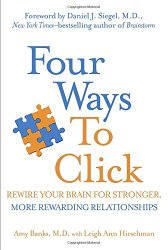
 Four Ways to Click
Four Ways to ClickRewire Your Brain for Stronger, More Rewarding Relationships
Review posted June 3, 2015.
Tarcher, 2015. 320 pages.
Starred Review
The premise of this book is an easy one to believe: We are wired for connection. Connection with people is good for us. However, the authors point out that this seemingly obvious truth goes against accepted wisdom about mental health.
The book begins like this:
Boundaries are overrated.
If you want healthier, more mature relationships; if you want to stop repeating old patterns that cause you pain; if you are tired of feeling emotionally disconnected from the people you spend your time with; if you want to grow your inner life, you can begin by questioning the idea that there is a clear, crisp line between you and the people you interact with most frequently.
The authors expand on that idea further in the introductory chapter:
This book is going to show you a different way of thinking about your emotional needs and what it means to be a healthy, mature adult. A new field of scientific study, one I call relational neuroscience, has shown us that there is hardwiring throughout our brains and bodies designed to help us engage in satisfying emotional connection with others. This hardwiring includes four primary neural pathways that are featured in this book. Relational neuroscience has also shown that when we are cut off from others, these neural pathways suffer. The result is a neurological cascade that can result in chronic irritability and anger, depression, addiction, and chronic physical illness. We are just not as healthy when we try to stand on our own, and that’s because the human brain is built to operate within a network of caring human relationships. How do we reach our personal and professional potential? By being warmly, safely connected to partners, friends, coworkers, and family. Only then do our neural pathways get the stimulation they need to make our brains calmer, more tolerant, more resonant, and more productive.
The good news for those of us whose relationships don’t always feel so warm or safe: it is possible to heal and strengthen those four neural pathways that are weakened when you don’t have strong connections. Relationships and your brain form a virtuous circle, so by strengthening your neural pathways for connection, you will also make it easier to build the healthy relationships that are essential for your psychological and physical health.
This book consists essentially of information about the four main neural pathways and ideas for strengthening each one. There’s a self-assessment at the start to see how your brain and relationships are doing.
The author calls her approach the C.A.R.E. Plan. C. stands for Calm; A. stands for Accepted; R. stands for Resonant; and E. stands for Energetic.
Each of these four pathways is a feedback loop. Supply the loop with good relationships, and most of the time, the pathway will become stronger. Strengthen the pathway, and your relationships become more rewarding. There are plenty of places in each loop to step in and boost the entire system.
I came away from the book feeling that I’m in a pretty good place. This book looks at the relationships to which you give the most time – in terms of thought and energy – so you aren’t counted “down” if you are not in a romantic relationship. Living alone, I wasn’t quite sure if I was cheating by counting the three people I email with daily or almost daily, but I do give them a lot of thought energy, and filling out the questionnaire confirmed that these connections are good for me.
The book did give me things to think about. For example, if I’m feeling a need for a pick-me-up, it might be a good idea to reach for the phone rather than play a game of Candy Crush. If I reinforce getting dopamine by reaching out and connecting, that pathway will become all the stronger.
This book is about all relationships – with family, friends, and coworkers, as well as with a “significant other.” It gives you plenty to think about for strengthening this crucial part of human life.
I’m thinking this might be a great gift for a college graduate. Rather than giving the message, “Okay, time to stand on your own two feet!”, this book reinforces the message that they will need other people in their lives – and will be healthier and happier the more they learn to connect with others.

